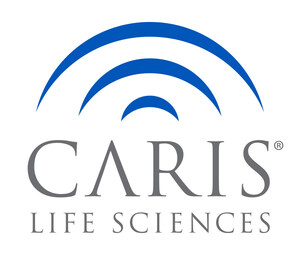Tumor Profiling of Metastatic Prostate and Small Cell Bladder Cancers with Caris Molecular Intelligence Yields Insights into Novel and Conventional Therapeutic Options
Research Presented at 2015 Genitourinary Cancers Symposium Highlights Clinical Utility of Caris Molecular Intelligence in Identifying Potential Treatment Strategies for Challenging Genitourinary Cancers
IRVING, Texas, Feb. 26, 2015 /PRNewswire/ -- Caris Life Sciences® today announced the presentation of two posters, at the 2015 Genitourinary Cancers Symposium in Orlando, Fla., that highlight the clinical utility of tumor profiling. Both studies utilized Caris Molecular Intelligence™, the company's panomic, comprehensive tumor profiling service, to identify biomarkers that shed light on potential treatment strategies for metastatic prostate cancer and small cell bladder cancer (SCBC).
In one study, researchers reported that Caris Molecular Intelligence highlighted molecular changes associated with metastatic prostate cancer and identified a clinically targetable alteration in 100% of 497 cases studied using a multiplatform approach, which could not be identified through next generation sequencing, immunohistochemistry, or in situ hybridization alone. The results yield insights into potential therapeutic strategies that may include a combination of targeted therapies as well as traditional cytotoxic chemotherapies. In a separate study, Caris Molecular Intelligence identified biomarkers that may clarify treatment dilemmas for patients with SCBC, a rare, aggressive subtype of bladder cancer that is highly similar molecularly to small cell lung cancer, and which responds poorly to chemotherapy. This study represents the most comprehensive molecular analysis of this patient population.
Both studies, to be presented during general poster sessions on Thursday, Feb. 26, 2015 and Friday, Feb. 27, 2015, utilized Caris Molecular Intelligence's multi-platform approach, which included gene sequencing (Sanger and next-generation sequencing [NGS]), protein expression analysis (immunohistochemistry [IHC]), and gene copy number analysis (chromogenic or fluorescence in situ hybridization [CISH or FISH]). Investigators in each study examined tumor samples for underlying molecular alterations that may yield potentially different therapeutic options for patients with these tumor types.
"Prostate cancer and small cell bladder cancer present distinct sets of therapeutic challenges, in that the former may respond to a mix of novel and conventional therapies, while response and resistance mechanisms are still being elucidated for the latter," commented Sandeep K. Reddy, M.D., Chief Medical Officer at Caris Life Sciences, and a co-investigator in each of the two studies. "The data presented at the Genitourinary Cancers Symposium demonstrate how multiplatform molecular profiling with Caris Molecular Intelligence can yield a better understanding of the molecular makeup of these challenging tumor types as a guide to therapeutic decision-making."
Metastatic Prostate Cancer Study Highlights
Researchers used Caris Molecular Intelligence to evaluate 497 prostate cancer samples, of which 287 (58%) were metastatic, including 66 (23%) from bone, 68 (24%) from lymph nodes, and 149 (52%) from visceral organs. The metastatic specimens exhibited significant differences in epidermal growth factor receptor (EGFR) amplification/overexpression, along with low methylguanine-DNA methyltransferase (MGMT) expression, topoisomerase (TOPO) 1/2A overexpression, and a higher rate of PTEN (a tumor suppressor protein) mutation, compared to primary prostate cancer samples. According to the investigators, these molecular alterations indicate a role for EGFR/PTEN in progression of prostate cancer, while also suggesting that patients with metastatic prostate cancer may respond to therapies that target the mitogen-activated protein kinase (MAPK) or protein associated with MYC (PAM) pathways, alkylating agents, or topoisomerase inhibitors.
The investigators also reported greater genetic instability in the mutational profiles of the metastatic specimens, with mutations observed in 60% of the genes tested, compared to 30% of the genes assayed in the primary tumors (P=0.0067). Notable mutational events in the metastatic subgroup included APC and β-catenin, PTEN, TP53, and BRCA1/2. Subset analyses revealed higher EGFR amplification in bone (29%) and visceral (24%) metastases than in those from lymph nodes (13%; difference not significant). Whereas low thymidylate synthase (TS) expression was more frequent in bone versus lymph node metastases (P=0.004), TOPO2A overexpression was higher in visceral than in bone metastases (P=0.0001), and programmed cell death protein 1 (PD-1)-positive infiltrating lymphocytes were more abundant in lymph node than in bone metastases (P=0.09). Additionally, the investigators noted that cMET overexpression (in seven of 230 samples) and amplification (in one of 162 samples) were rarely observed across the cohort, providing support for the surprising failure of cabozantinib in men with castration-resistant prostate cancer.
"The presence or absence of metastasis is a determining factor for prostate cancer prognosis, as well as for selection of therapy," commented lead investigator Rebecca Feldman, Ph.D., Research Scientist at Caris Life Sciences. "Our data support the use of molecular profiling to identify therapeutic options that may be appropriate for subsets of patients. In particular, molecular changes associated with metastatic disease, including EGFR, PTEN, MGMT, and TOPO1/2A, present opportunities for developing therapeutic strategies that may involve targeted agents as well as traditional cytotoxic chemotherapy."
SCBC Study Highlights
Using Caris Molecular Intelligence, investigators evaluated 19 SCBC specimens to identify potential targets and therapeutic options for patients with this rare tumor subtype. IHC testing revealed molecular alterations associated with potential benefit to traditional chemotherapy; these included loss of ribonucleotide reductase M1 (RRM1, in four of 18 cases [22.2%]), MGMT (15/18 [83.3%]), and TS (5/19 [26.3%]). High expression of the DNA excision repair protein ERCC1, which is associated with resistance to platinum-based therapy, was observed in three of eight cases (37.5%). The multidrug resistance protein 1 (MRP1), associated with resistance to various chemotherapies, was present in all five (100%) of specimens tested for this protein. PD-L1, the ligand to PD-1, was not expressed in any (0%) of the six samples assayed. EGFR amplification was detected in one of four (25%) specimens. Aberrations revealed by NGS included TP53 (90%), cMET (20%), RB1 (11.1%), FBXW7 (10%), and PTEN (10%). Sanger sequencing also detected mutations in KRAS (1/1 [100%]) and PIK3CA (1/3, 33.3%).
"There is a need for novel therapies based on a better understanding of the underlying mechanisms of transformation in small cell bladder cancer," said Jue Wang, M.D., Section Leader of the Genitourinary Oncology Division at the University of Arizona Cancer Center at St. Joseph's in Phoenix, and lead investigator of the study. "Overexpression of MRP1 and loss of TP53 may help explain this cancer's resistance to traditional chemotherapy and its aggressive course. Our study identified several potential therapies for SCBC, some of which, like temozolomide, are not typically considered. At the same time, the absence of PD-L1 expression suggests that immunotherapy may not be as beneficial. Additionally, next-generation and Sanger sequencing helped us identify cell surface receptors and downstream molecules that may be candidates for therapeutic strategies."
About Caris Life Sciences® and Caris Molecular Intelligence™
Caris Life Sciences® is a leading biosciences company focused on fulfilling the promise of precision medicine through quality and innovation. Caris Molecular Intelligence™, the industry's leading tumor profiling service with more than 68,000 patients profiled, provides oncologists with the most potentially clinically actionable treatment options available to personalize cancer care today. Using a variety of advanced profiling technologies to assess relevant biological changes in each patient's tumor, Caris Molecular Intelligence correlates biomarker data generated from a tumor with biomarker-drug associations supported by evidence in the relevant clinical literature. The company is also developing a series of tests based on its proprietary Carisome® TOP™ platform, a revolutionary blood-based testing technology for diagnosis, prognosis, and theranosis of cancer and other complex diseases. Headquartered in Irving, Texas, Caris Life Sciences offers services throughout Europe, the U.S., Australia and other international markets. To learn more, please visit www.CarisLifeSciences.com.
SOURCE Caris Life Sciences
Related Links
http://www.carislifesciences.com
WANT YOUR COMPANY'S NEWS FEATURED ON PRNEWSWIRE.COM?
Newsrooms &
Influencers
Digital Media
Outlets
Journalists
Opted In






Share this article